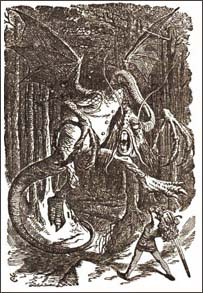Alas, I strayed from my original intention of always having a reference to Lewis Carroll’s works in this blog. In truth, it was harder than I thought! But therein lies a challenge – and I’m always up for those.
So here’s a bit of trivia…..
Jabberwocky , from Through the Looking Glass, is a seemingly nonsensical poem. Much has been made of the fact that, even though the words don’t seem to really be words, the tone and action of the poem tell the tale of a horrendous monster and its demise. Personally, I always considered it an example of mind over matter – being able to show and not tell, leading your reader to the thing you wanted him to know, without really exposing it.
Here’s the first verse -
“‘Twas brillig, and the slithy toves Did gyre and gimble in the wabe;
All mimsy were the borogoves
And the mome raths outgrabe.”
Did gyre and gimble in the wabe;
All mimsy were the borogoves
And the mome raths outgrabe.”
Carroll was fond of portmanteaus – words that are made up of other words, and declared that all the words in this poem DO have origins** (I think he made up his own dictionary).
- Bryllig, derived from the verb ‘to bryl’ (boil), loosely means ‘the time of broiling dinner’ – suppertime!.
- Slythy is compounded of ‘slimy’ and ‘lithe’, and means ‘smooth and active’.
- Tove is a species of badger. The physical description doesn’t sound like any badger I’ve ever seen. “Smooth white hair, long hind legs, and short horns like a stag. It lives chiefly on cheese.”
- Gyre means ‘to scratch like a dog’.
- Gymble translates ‘to screw out holes in anything’.
- Wabe is ‘the side of a hill’.
- Mimsy is from ‘mimserable’ (unhappy).
- A Borogove is an extinct kind of parrot. Like the badger, the physical description leaves this somewhat doubtful. “No wings, beaks turned up, made nests under sundials and lived on veal.”
- Mome – from ‘solemome’ meaning ‘grave’.
- Rath is a land turtle. Now, really – the description says “Head erect, mouth like a shark, the forelegs curved out so the animal walked on its knees – with a smooth green body and lived on swallows and oysters.”
- Outgrabe is the past tense of ‘outgribe’. Carroll says it means ‘squeaked’.
I’m not making this up, folks – just telling you what I was told.
In Through the Looking Glass, Humpty Dumpty explained the poem to a dumbfounded Alice. Apparently, even Carroll himself realized how outlandish some of his words were, for Humpty’s explanations – especially the animal descriptions - are a bit milder. I’ll give you that another day.
** Most of this information was gathered from Lenny’s Alice in Wonderland site. Link is shown in my sidebar.






Looks like his fingers got off the home keys:) Interesting post:)
thanks!
fun to read – always wondered about his words. . .some silly, some fun, some just weird. . .
Yes, but doesn’t it keep you on your toes figuring it out? Love it!